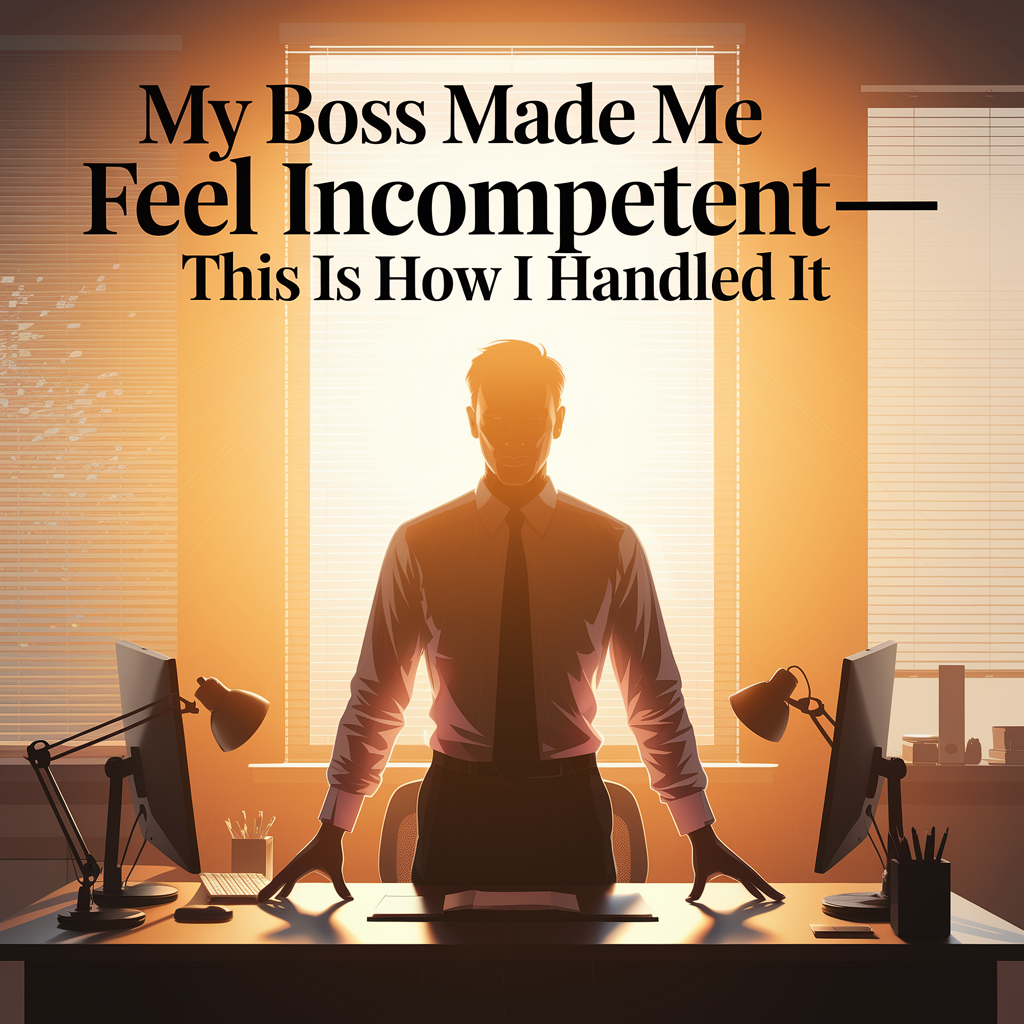
How I Knew My Boss Was Making Me Feel Incompetent
There was a stretch at work where I felt like I couldn’t do a single thing right. My boss had this way of nitpicking everything I did. I’d hand in a project early—he’d say it was rushed. I’d stay late to perfect a task—he’d ask why I wasn’t managing my time better. No matter what I did, I felt like I was failing. And the worst part? I started believing it.
When your boss makes you feel incompetent, it doesn’t always show up in big, dramatic blow-ups. Sometimes it’s the subtle digs. The raised eyebrows in meetings. The way they correct you in front of others like you’re a rookie. It chips away at you until you’re second-guessing your every move—even stuff you’ve done a hundred times before.
I remember standing in front of my closet one morning, shirt in hand, and wondering, “What’s the point of even showing up today?” I didn’t feel like a man—I felt like a punching bag with a name tag.
If you’re feeling that same pressure, I want you to know you’re not alone. There’s nothing weak about recognizing when you’re being treated unfairly. It takes strength to be honest about how much it’s messing with your head.

Is It Just Me, or Is My Boss Toxic?
At first, I assumed I was just being sensitive. Maybe I needed thicker skin. That’s what we’re told as men, right? Shake it off. Toughen up. Don’t let it get to you. But after months of this same cycle—work hard, get torn down—I started asking a hard question: Is this just me… or is my boss the problem?
If you constantly feel anxious around your boss, like you’re walking on eggshells, that’s not just pressure—that’s a toxic environment. When you find yourself saying “my boss makes me feel incompetent”, that’s a red flag. A good leader builds you up, even when giving feedback. A bad one chips away at you to stay in control.
Here’s what I started noticing:
- I’d come home completely drained—even on days that weren’t that busy.
- I avoided speaking up in meetings because I didn’t want to be shut down.
- I dreaded Monday mornings… and Sunday nights.
- I lost interest in hobbies I used to love.
That last one hit me hard. When your confidence is shot at work, it bleeds into everything. I stopped working on my truck. I stopped playing guitar. I even caught myself snapping at my kids for things that didn’t matter.
What helped? Finding outlets to rebuild my confidence. I started focusing more on teaching my son things school won’t touch—like how to fix things with his hands, how to speak up for himself, and how to lead with quiet strength. That small shift led me to write this post:
👉 What I’m Teaching My Son That School Never Will
And let me tell you, doing that reminded me that I do have value—even if my boss can’t see it.

What to Do When You Start Questioning Your Worth
When I hit rock bottom with this situation, I found myself doing something I never thought I’d do—I googled “feeling incompetent at work.” Just to see if anyone else had been there. Turns out? A lot of us have. Especially guys who care about their work and want to do it right.
Here’s the reality: just because your boss treats you like you’re disposable doesn’t mean you are.
If you’re stuck in your head wondering how to overcome incompetence, you need to pause. Because chances are, you’re not actually incompetent—you’re being conditioned to feel that way.
Here’s what helped me regain my footing:
- I kept a wins journal. Every day I wrote down something I did well, even if it was small. It reminded me that I wasn’t useless.
- I asked coworkers I trusted for honest feedback. They helped me see the full picture—and guess what? It didn’t match my boss’s criticism.
- I stopped giving my boss unlimited access to my self-worth. I set boundaries mentally. His opinion wasn’t gospel.
If you’ve ever caught yourself second-guessing every move, you’re not broken. You’re being manipulated. You can fight that, and it starts by trusting that quiet part of you saying, “This ain’t right.”
And if you’re a dad like me, dealing with this while trying to raise your kids right? That’s a whole extra weight. Here’s a piece I wrote during that season when I was mentally drained:
👉 Why Being a Good Dad Feels So Exhausting Sometimes
It’s worth the read if you’re juggling fatherhood and pressure at work.

How I Reclaimed My Confidence One Step at a Time
No, I didn’t quit my job overnight. I didn’t march into HR with a dramatic speech. But I did start showing up differently—for myself, not for my boss.
I got back into daily routines that made me feel capable. One of the weirdest things that helped? Fixing small things around the house. Tightening a doorknob. Patching drywall. Little wins that proved I could follow through.
I also started journaling—not some fluffy “dear diary” stuff. Just bullet points about what I handled that day. Things like:
- Gave solid input in the 10 a.m. meeting.
- Didn’t take the bait when my boss got passive-aggressive.
- Cooked a full meal for the family—without burning it.
And if you’re wondering what I made, here’s the simple recipe I use when I need a no-fail dinner that makes me feel like a provider again. It might not seem like a big deal, but feeding your family with your own hands? That’s real power.
Confidence isn’t always about the big gestures. Sometimes, it’s just about proving to yourself you’re not who they say you are.

Is Your Boss Actually the Problem?
Let’s call it like it is: not all bosses are leaders.
Some are just insecure people with authority. And when they don’t know how to lead, they manage by intimidation, criticism, or silence. If you’re constantly walking on eggshells, wondering if your boss secretly wants you gone, it might not be about you—it might be about their lack of skills.
Here’s what helped me figure it out:
- Pattern check. Does this happen with everyone on the team or just you? If everyone looks drained, it’s probably not a “you” issue.
- Backhanded compliments. Phrases like “That’s actually not bad” or “I guess you’re getting there” aren’t feedback—they’re digs in disguise.
- Micromanaging everything. Bosses who hover and nitpick usually don’t trust themselves, let alone their team.
This stuff messes with your head and chips away at your confidence. It can even bleed into your health. During one stretch under a toxic boss, I noticed I was constantly anxious, breaking out in sweat for no reason—even when I was cold. That’s when I found out about hyperhidrosis—a condition where your body sweats nonstop.
Stress can absolutely trigger it. And sometimes, fixing that means fixing your environment.

How to Stay Mentally Strong Without Losing Your Cool
If you’re anything like me, your gut reaction might be to fight back or shut down completely. But there’s a third option: stay sharp without stooping to their level.
Here’s what I practiced:
- Document everything. If your boss is shady or passive-aggressive, keep a journal. Just the facts. You’ll thank yourself later if it escalates.
- Practice the pause. I trained myself not to reply emotionally. Give it five seconds. Breathe. Then respond like the calmest version of yourself.
- Build your value outside of work. For me, that meant fixing stuff, reading more, and getting back to the gym. (Here’s the home tool kit I use to handle nearly anything—it’s helped me feel like a man again when work made me feel useless.)
And let me tell you: the more I poured into my personal growth, the less power my boss had over me. Because the more I remembered who I am, the less I needed his approval.

Can Feeling Incompetent at Work Mess with the Rest of Your Life?
Absolutely. And if you’re like most men, you won’t talk about it—you’ll just carry it all like it’s your job. The problem is, that weight spills over into everything.
When I was stuck under a boss who constantly made me feel like I wasn’t enough, I wasn’t just dreading the office—I was short-tempered at home, losing interest in things I usually loved, and my sleep was garbage.
I started thinking I had a motivation problem, but really? I had a respect problem. And it was making me doubt everything about myself.
If that’s where you’re at, don’t let it spiral. Build yourself back up in small ways. I started journaling at night and reminding myself what actually mattered. One night, I stumbled into writing out this thought: “What I teach my son will matter more than what any manager says about me.”
That reminder turned into this: what I’m teaching my son that school never will. Writing it helped me reset.
It’s okay to admit you’re feeling off—just don’t stay stuck there. You’ve got more in you than one toxic job or one bad manager.

What If You’re Starting to Believe You Really Are Incompetent?
That’s the dangerous part. When someone keeps pushing you down long enough, you start staying there without even realizing it.
But here’s the truth: if you’ve made it this far in life, you’ve already proven you’ve got grit. You’ve made it through hard times, figured out problems no one else noticed, and kept going when quitting would’ve been easier.
That’s competence. That’s strength.
If you need a push to get that fire back, try this: train a new skill or fix something with your hands. There’s something about doing real work that rewires your brain to believe in yourself again.
Start with something like this home emergency kit or a tool you’ll actually use often. It’s a small win, but it reminds you—you can do stuff. You can solve problems. You’re not broken.
You’re just in a tough spot. And that doesn’t define you.

Should I quit my job if my boss keeps making me feel worthless?
That depends. If your boss is just tough but fair, there might be room to grow. But if they’re tearing you down daily and it’s crushing your confidence or affecting your home life, you’ve got to start planning an exit. Don’t let one toxic leader wreck your long-term confidence. Start looking while you’re still employed. That’s how you stay in control.
Is it me—or is my boss actually the problem?
That’s a tough one, but worth asking. Sometimes we get in our heads, especially if we’re going through a rough patch. But if your boss constantly criticizes, never gives real feedback, or plays favorites, it’s probably not you. One way I tested this? I asked a respected coworker for honest feedback. Their response opened my eyes—and reminded me I wasn’t crazy for feeling beat down.

How can I rebuild confidence when I feel totally useless at work?
Start by racking up small wins outside of work. Fix something at home. Learn a new skill. Reorganize your garage. I started small by building something useful—like keeping a reliable flashlight in my car or setting up tools every guy should own. These kinds of actions remind you that you’re capable—even if your boss doesn’t say it.
What should I do if I start dreading going to work?
That’s your mind and body waving red flags. First, figure out what specifically causes that dread. Is it one task? One person? Or the whole vibe? Once you know the trigger, you can start taking action—either by shifting roles, setting boundaries, or prepping your way out. Just don’t ignore it. Long-term dread turns into burnout, and burnout turns into regret.

Can talking about it with my spouse or a buddy really help?
Yes. You’d be surprised what just saying the words out loud can do. I talked to a buddy about it once—expecting a short vent session—and he hit me with, “Bro, why are you letting some dude define you?” That snapped something in me. Whether it’s your wife, your best friend, or a guy you trust, get it off your chest. It helps more than you think.
As an Amazon Associate we earn from qualifying purchases through some links in our articles.




